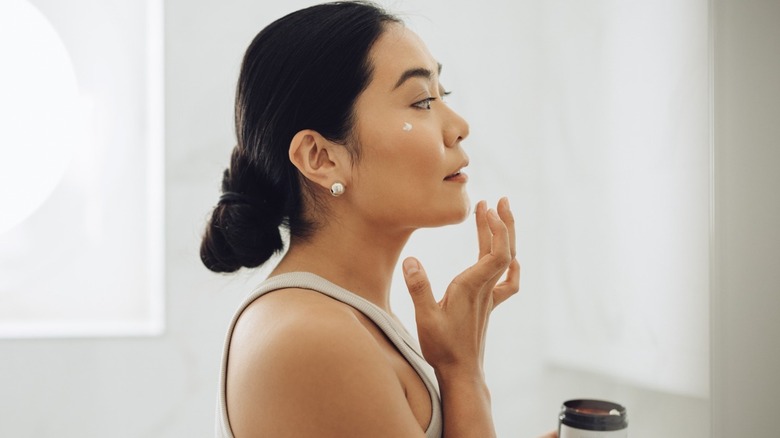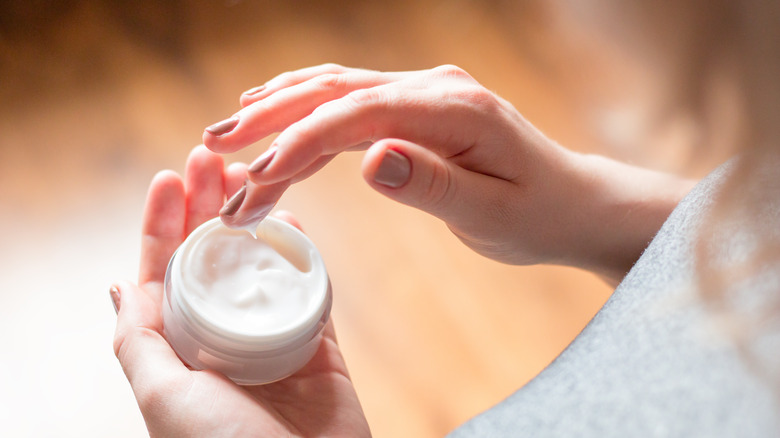You Need Different Moisturizers For Day And Night - Here's Why
Moisturizing might be the single most important step after cleansing your face. Keeping the skin hydrated can rejuvenate your appearance and ward off a myriad of issues, including acne, uneven texture, and oiliness. While the best hydration comes from within, using a moisturizer is just as essential. Figuring out which ingredients will benefit your skin most is crucial, but the biggest mistake you're probably making with your moisturizer is using just one.
Yes, you need different moisturizers for day and night. While it may sound unnecessary, remember that the skin is our largest organ and that it plays a vital role in our everyday functioning. During the day, the skin's assignment is to protect itself (meaning you) from any harmful substances, such as external environmental factors as well as general injuries.
When we go to sleep, the skin no longer needs to work as a shield and goes into recovery mode, which is when it needs extra hydration and nutrients. Because of the contrasting stages that the skin goes through, it benefits from different ingredients at different times. Use separate moisturizing products for day and night, and your skin will thank you by looking and feeling its best.
The skin works differently during day and night
Using a different moisturizer for daytime and nighttime might not be at the top of your beauty to-do list, but it should be. The skin doesn't work the same during the day and when you sleep, which is why the same moisturizer won't be as effective in both periods of time. According to Dennis Gross, a board-certified dermatologist and dermatologic surgeon, "During the day, skin is in a protective state, warding off elements such as sun damage or oxidation," as he explained to Harper's Bazaar.
On the other hand, at nighttime, "Your immune system is functioning at its maximum capacity and your skin is going into repair mode, regenerating new skin cells and cycling oxygen and nutrients." Because of this, it's important to be mindful of what you put on your skin in the morning and before you go to sleep. "Daytime moisturizers [should] have SPF to protect you from UV rays when you're walking around outside," board-certified dermatologist Jessica Wu shared with Byrdie.
Gross also recommends including ingredients like antioxidants and hyaluronic acid too, for extra protection from external elements. As for nighttime, board-certified dermatologist Julie Russak says to focus on quality components that will replenish the skin in its reparative state. "Look for ingredients in night creams that boost collagen production, such as peptides—which also have the added benefit of containing signaling molecules to smooth and relax muscles," she advised when speaking to Forbes.
SPF should always be your top priority
While it won't be the end of the world if you don't use different moisturizers for day and night, it will do you good. According to Jessica Wu, "Many of my patients prefer using different products for day and night because they want the benefits of different ingredients," as she informed Byrdie. During the day, always use a moisturizer with SPF, not only to prevent sun damage but also to ward off premature aging and skin discoloration.
Likewise, as not all skincare ingredients are safe to be exposed to sunlight, nighttime is the best time to focus on tackling any skin problems you might have. According to aesthetics doctor Barbara Sturm, retinol, exfoliating acids, and vitamin C should never be used during the day as they weaken the skin's protective barrier, making it more prone to sun damage (via Vogue). When the skin goes into repair mode, it will absorb all the nutrients from your skincare products much better than when it's working to protect itself during the day.
If you don't want to use two different moisturizers, Wu advises going for one that has SPF regardless. "There's no harm in using SPF at night," she confirmed to Byrdie, adding that it's still best to have two separate products for moisturizing the skin in the different stages of its cycle regardless.


